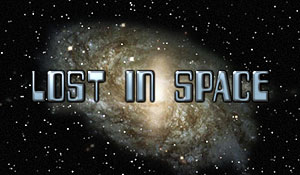
“…and the monkey flips the switch”
Like Star Trek, the Lost in Space television series found increasing popularity and became a smash hit in syndication. Irwin Allen, still angry over its cancellation, proposed a sequel series in 1969 called Rodney the Robot. Initially his idea was flatly rejected until he explained to executives that Rodney was actually the name of the robot from Lost in Space. CBS and ABC executives both listened to his concept which detailed how Rodney had gotten separated from the Robinson family and had found a way to return to Earth where he was adopted by a typical American family. The sequel series would show Rodney as a mechanical butler. Although neither network liked the idea, CBS considered it given Allen’s track record with Lost in Space. They were having misgivings for canceling the series only to have its replacement, Daktari, perform poorly in the same timeslot. In fact, Lost in Space did better in reruns in a poor timeslot than Daktari did in its first run. They considered possible adaptations of Allen’s idea but ultimately rejected all of them.
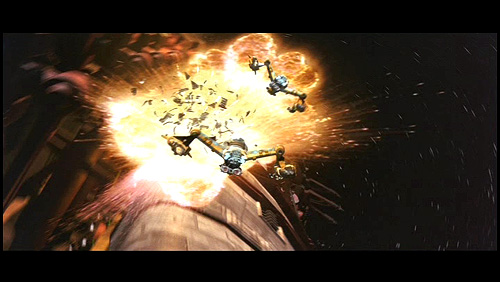
In the next couple of years, Irwin Allen’s Hollywood influence faded quickly. His ABC series, Land of the Giants was in a downward spiral by 1970 and his TV pilots, “Safari”, “Aladdin”, “How to Make a Man”, “City Beneath the Sea”, and “Man from the 25th Century”, each intended to launch a series, were all soundly rejected by the studios. He returned to the large screen where he regained some recognition for the 1972 “The Poseidon Adventure” and the 1974 “The Towering Inferno” disaster films.
By 1973, the Lost in Space concept regained some moderate life through the Hanna-Barbera cartoon movie, Lost in Space. In this version, the original series voice of Dr. Smith and the Robot were continued as portrayed by the original actors. All other voices were played by poor duplicates of the series. The storyline was tolerable but the animation was substandard. It was a cheap copy of the series despised by the few fans who saw it.
By 1975, all studio-connected Lost in Space merchandise ceased production due to poor sales. Irwin Allen continued to try to convince various studios to revive the series as a continuation that extended the original storyline in a more refined way. His proposals all fell on deaf ears until 1979, when Star Trek: The Motion Picture was released as a feature film. CBS briefly considered a trial run of the series but then abandoned the idea.
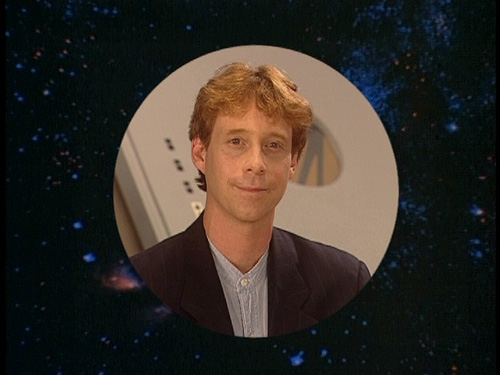
In 1980, Bill Mumy decided to take matters into his own hands to resolve the fate of the Robinsons. He authored a script in which the Robinsons had been marooned for many years on a desolate planet. Taking a far more serious tone than seen in the television series, the tale was partly a story of survival in which Will had become a recluse and Smith was a hardened old man. He pitched the idea to CBS who contacted the other cast members. All expressed interest in doing the film. When the executives contacted Irwin Allen he denounced the idea and said that Lost in Space would not return until he had authored the script. Since Allen retained the rights, there wasn’t anything he could do. Irwin Allen refused to even read Mumy’s script.
Irwin Allen died in 1991.
New Line Cinema obtained the rights to Lost in Space and immediately set forth plans to make a big-budget remake of the original series. They contracted Akiva Goldsman to author the script and Stephen Hopkins to direct the film. Mark Goddard, June Lockhart, Angela Cartwright, and Marta Kristen all agreed to cameo roles in the film.
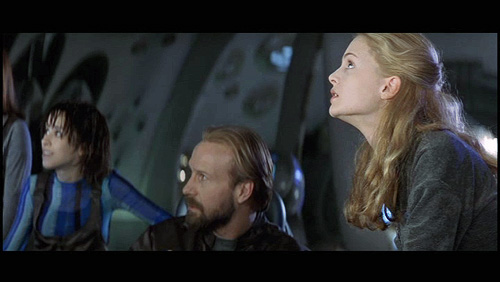
The remake followed a well-coordinated multi-themed script in which Professor Robinson (William Hurt) and his daughter Judy (Heather Graham) are obsessed with establishing a hyperspace gateway at Alpha Centauri to allow follow-on colony ships to leap to the destination and begin immediate material shipments back to Earth that would save the planet from an impending environmental disaster. Faced with a Cold War by the ill-defined Sedition, the Robinson mission is plagued from the start by problems stemming from spies and sneak attacks by enemy fighters. A hero of the growing conflict with the Sedition is Major West (Matt LeBlanc) who is Shanghaied into piloting the Jupiter 2 to her destination.
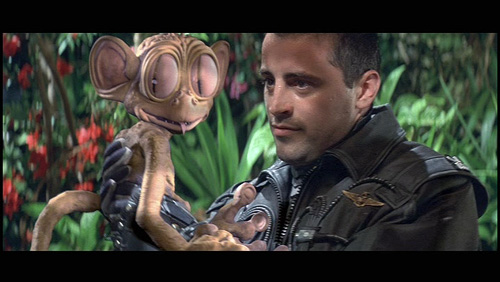
Duplicating the premise of the original series, the mission’s medical doctor, Dr. Zachary Smith (Gary Oldman), sneaks aboard the spacecraft with the intent on sabotaging the mission. He programs the ship’s robot to become active during the flight, kill the family, and destroy the navigational equipment aboard the spacecraft. Prior to his escape, he is betrayed by the Sedition leader who sent him there and, incapacitated, the Jupiter 2 launches with Smith as an unwilling passenger.
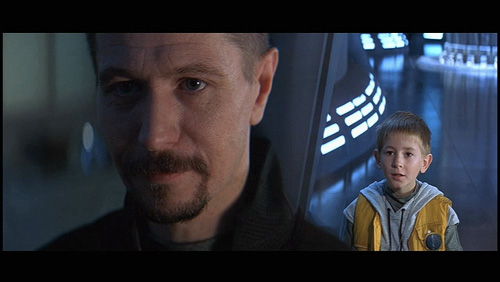
Dr Smith’s allegiances are detected early in the film by Major West. Unlike the series, in the remake, Smith is regarded with significant suspicion. When the Jupiter 2 encounters an anomaly in a strange, abandoned Earth ship that defies the Jupiter 2 crew’s understanding, Smith is forced to come along to prevent him from causing mischief on the ship.
Boarding the Earth ship the Robinson’s learn that the derelict vessel is a rescue ship sent after them years after they left Earth, proving that the Jupiter 2 is not only lost in space but in time as well. Things go from bad to worse, as the ship is infested with alien spiders that chase them back to their own craft. Major West torpedoes the derelict, causing an explosion that sends the Jupiter 2 crashing onto a nearby planet.
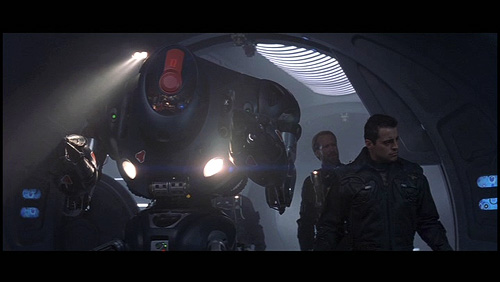
The planet, a truly alien environment, proves little better than the danger they’d just escaped. Near their landing site, they find the wreckage of the Jupiter 2, indicating another shift in time and their impending destruction. Within the core of the wreck is a now adult Will Robinson who has progressed his time machine design into a time-space displacement device powered by the reactor of the spacecraft. The adult Will has been the cause of the disruptions of time and space. Left alone with a mutated Dr. Smith, now a spider lord harboring the surviving spiders from the derelict, Will has become a mad scientist working to open a gateway that leads back to Earth just prior to the launch of the Jupiter 2. He intends to stop the launch and reverse the disaster that has befallen his family.
Smith however, has different plans. Now more alien than human, he intends to use the gateway to go to Earth and infest it with his spider offsping.
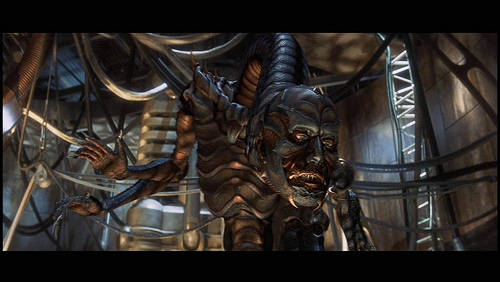
In the end, Smith is defeated and the Jupiter 2 escapes both the planet and their doomed future, heading off into space in search of a path that might lead them back to their own time on Earth.
Comment: The movie was clever, well executed, and provided a lot of action. The story delivered a good mix of character interaction and space opera icons. Especially touching was the interactions between Professor Robinson and Will. Gary Oldman delivered a believable Dr. Smith, far more sinister than his television counterpart, convincingly threatening, yet worthwhile enough to provide the Robinsons with some reason to keep him aboard. He brought the charming aspects of Jonathan Harris’ performances into his own delivery, giving his Dr Smith a distinctive edge.
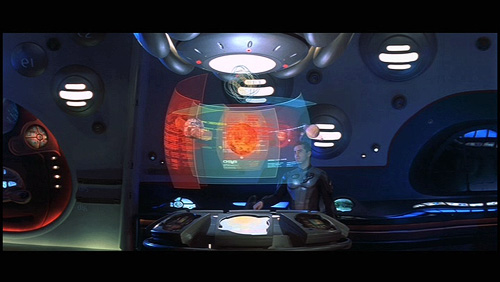
Unfortunately, the Lost in Space movie failed with both critics and fans. Critics tore into the story, attacking it for lacking true depth. Few recognized that it was a mix of the campy feel of the 60s television series and a contemporary storyline. Fans rejected it, partly because the characters were a bit too different than they had expected, partly because many disliked the increased focus on the Robinson family that shifted from the television series’ pure focus on situational conflict, and largely because two important series icons had been dumped in Hollywood’s fever for updating classic elements for the sheer sake of presenting something new.
The robot, ever the symbol of the television series, was replaced with a new design that only vaguely resembled its origins. Likewise, the Jupiter 2, originally encased in a hull that duplicated the television series spacecraft, was a slender, flattened orb that most considered substandard to the charm of the original Jupiter 2, whose simplicity was its beauty.
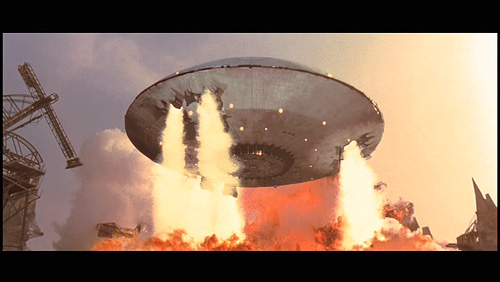
Original Jupiter 2 Design (seen briefly)
The story’s multiple interlinked elements also put a strain on some viewers. The cause and effect reactions and counter-reactions resulting from the time-space displacement theme confused some who were ready for a far more simplistic and straightforward adventure tale. Likewise, interpersonal conflicts, especially the new aspects of Major West’s advances towards Judy, seemed an odd fit to many who recalled and liked the more one-dimensional presentation of the old show.
However, the film failed to grab the audience and didn’t provide the studio with a desire to do any sequels. New Line Cinema had other areas to focus itself on and Lost in Space wasn’t one of them.
-written by Russell Sanders